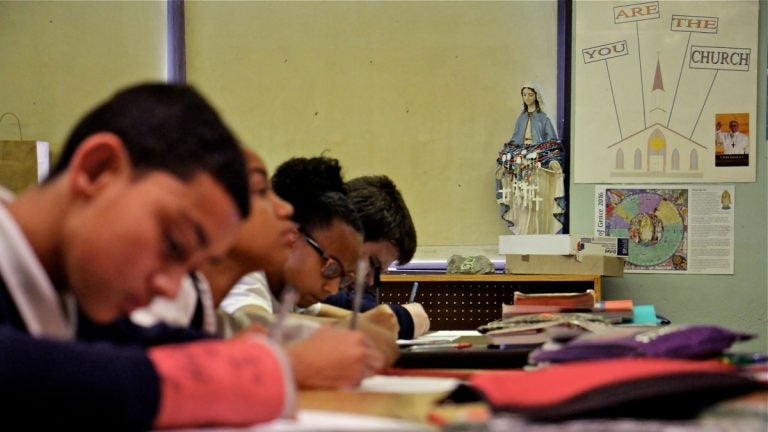Feds approve Pa. education plan that deemphasizes standardized testing
Now that US Education Secretary Betsy DeVos has approved Pennsylvania’s 13-year education-improvement plan, state officials are working on rolling out some changes.

Students in Elaine Carboni's 8th grade class at Saint Gabriel School take a vocabulary test. (Emma Lee/WHYY)
Now that US Education Secretary Betsy DeVos has approved Pennsylvania’s 13-year education-improvement plan, state officials are working on rolling out some changes.
The updated plan is designed to bring Pennsylvania into compliance with the Every Student Succeeds Act, the latest update of the federal education law that passed with bipartisan support in 2015. Compared to its predecessor, No Child Left Behind, ESSA gives states much more flexibility in setting policy and spending federal public school dollars.
One key change in Pennsylvania’s new plan is that it broadens how school success is measured.
Created by Gov. Tom Wolf’s education department, a new system dubbed the Future Ready PA Index is being released in the fall, and will track things like career readiness, along with existing criteria like test scores.
Critics, including the Republican chairmen of the House and Senate education committees and an independent panel of education policy experts, have complained the new measures are too vague. And they say the plan’s procedures for holding schools accountable to their improvement goals are too weak.
Matthew Stem, a Deputy Secretary with the Education Department, acknowledged the index is loose in certain areas.
But, he maintained, it’s supposed to be that way.
“If a system is designed that’s overly rigid, invariably you run into unintended consequences,” he said. “We want to design a system that affords us the ability to flexibly meet the needs of each school and community.”
The plan also makes state standardized tests an average of 20 percent shorter in third through eighth grades.
It still uses the Keystone Exams as the federal assessment for high school students. That’s something lawmakers on both sides of the aisle have been trying to change, arguing that it is expensive and time-consuming to administer. Some say nationally-normed test like the SAT or ACT would be a better option.
Stem said those tests wouldn’t necessarily square with state standards, and that review would be necessary.
WHYY is your source for fact-based, in-depth journalism and information. As a nonprofit organization, we rely on financial support from readers like you. Please give today.






